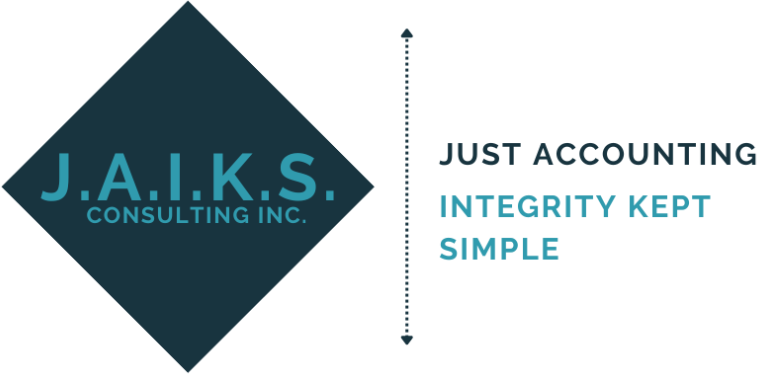J.A.I.K.S. BLOG
Welcome to J.A.I.K.S. Blog, a place where we will provide you with a variety of resources on accounting, taxation and other related subjects suited for both individuals and/or their businesses.
We hope you can find the answers to your questions and/or curiosities, and always know we are here to help if you need more.
Follow us on Facebook or find us on LinkedIn - we are always eager to give you more!
Disclaimer:
The content provided in this blog is for general informational purposes only and is not intended as professional accounting, tax, or financial advice. While efforts are made to ensure the accuracy and timeliness of the content, errors or omissions may occur. The content does not constitute a client-advisor relationship. Readers should consult with a Chartered Professional Accountants or other financial professional for advice tailored to their specific needs. We are not liable for any actions one might take based on the information provided in this blog.
3 minutes reading time
(519 words)
What is the best accounting procedure for a small business?
For small businesses in Canada, simplicity and efficiency are key when choosing an accounting procedure.
The easiest accounting procedure for a small business typically involves using a single-entry bookkeeping system and leveraging user-friendly accounting software.
According to the CRA, farmers, fishers, and self-employed commission agents can use the cash method or the accrual method to report income. All other self-employment income must be reported using the accrual method.
Here’s a step-by-step guide to setting up and using an easy accounting procedure:
- Choose an Accounting Method
- Accrual Basis Accounting: This method is generally the standard for business as it records revenues and expenses when they are earned or incurred, regardless of when the money is actually received or paid. This method provides a more accurate financial picture.
- Cash Basis Accounting: Records revenues and expenses when they are actually received or paid.
- Set Up a Single-Entry Bookkeeping System
- Single-entry bookkeeping is simpler than double-entry bookkeeping and can be sufficient for very small businesses.
- Record Income: Keep a log of all incoming payments, including sales, interest, and other income.
- Record Expenses: Track all outgoing payments, including operating expenses, salaries, utilities, and supplies.
- Maintain Receipts and Invoices: Keep all receipts and invoices organized by date and category.
- Single-entry bookkeeping is simpler than double-entry bookkeeping and can be sufficient for very small businesses.
- Use Accounting Software
- Leverage accounting software to streamline your bookkeeping. Some popular and user-friendly options for small businesses include:
- QuickBooks Online: Offers features for invoicing, expense tracking, and financial reporting.
- Wave: Free accounting software that provides invoicing, accounting, and receipt scanning.
- Xero: Provides a range of features including payroll, expense claims, and bank reconciliation.
- Leverage accounting software to streamline your bookkeeping. Some popular and user-friendly options for small businesses include:
- Open a Business Bank Account
- Separate your business and personal finances by opening a dedicated business bank account. This makes tracking income and expenses easier and ensures accurate financial records.
- Implement Basic Financial Statements
- Regularly prepare and review basic financial statements to understand your business’s financial health:
- Income Statement: Summarizes revenues, costs, and expenses over a specific period to show profit or loss.
- Balance Sheet: Provides a snapshot of your business’s assets, liabilities, and equity at a specific point in time.
- Cash Flow Statement: Tracks the flow of cash in and out of your business over a period.
- Regularly prepare and review basic financial statements to understand your business’s financial health:
- Automate and Schedule Regular Updates
- Automate Data Entry: Use your accounting software to import bank transactions and automate data entry.
- Schedule Regular Updates: Set a schedule for updating your financial records, such as weekly or monthly, to ensure accuracy and consistency.
- Seek Professional Advice When Needed
- While the above steps can help you manage basic accounting, it’s beneficial to consult a professional accountant or bookkeeper for:
- Tax Planning: Ensuring compliance with Canadian tax laws and optimizing tax benefits.
- Financial Advice: Getting insights into financial planning and business growth strategies.
- While the above steps can help you manage basic accounting, it’s beneficial to consult a professional accountant or bookkeeper for:
Contact our office for professional advice when setting up your accounting system. It will save you time and money in the long run
Summary
By choosing cash basis accounting, using single-entry bookkeeping, leveraging accounting software like QuickBooks or Wave, and maintaining regular financial updates, small businesses in Canada can set up an easy and efficient accounting procedure. This approach helps ensure accurate financial records, simplifies tax filing, and provides valuable insights into the business’s financial health.
Stay Informed
When you subscribe to the blog, we will send you an e-mail when there are new updates on the site so you wouldn't miss them.


Comments